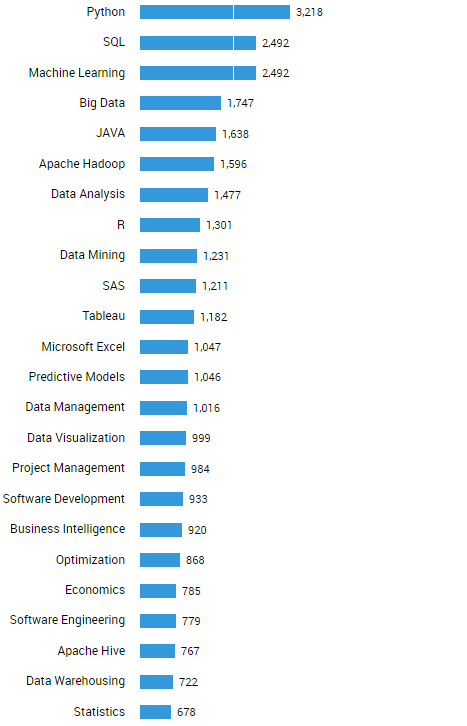If you’re reading this post, you may have already read dozens of articles about data science jobs, data scientists, programming languages, jobs, industries, and everything there is to know about the field. You might have already taken an online course or two and started wrangling and cleaning whatever data you can get your hands on. Moreover, you may even have a pathway planned to become a data analyst, engineer, modeler, or scientist. If that’s the case, then there isn’t much more to know about the field, except getting experience in it. Still, here are a few new details you may not have predicted about data science jobs as of March 2018.
Data Science Jobs are not Industry Specific
If you’ve only looked for data science jobs in the high tech or startup industry, you may be selling yourself short. Almost every industry sector is looking for new hires with data science skills. That includes, finance and insurance, manufacturing, public administration, healthcare, transportation, trade and more. Companies seeking new employees with data science skills are looking to fill positions as business intelligence analysts, software developers, database administrators, computer systems analysts, marking managers, sales engineers, financial quantitative analysts, as well as for other analytics focused roles.
If you’ve been eyeing a product management role at a new startup, or a data engineer position at a big consultancy or sub-contractor, don’t limit yourself. Look at the types of companies popular in your region and expand your search to include positions in different industries.
Getting Trained

Source: Burning Glass Technologies’ Labor Insight™ Real-time Labor Market Information tool
Being properly trained in data science is an important first step to getting a job in the field. Generally speaking, you can get a degree, take trainings, or be self-taught. Many cutting edge data science jobs have been built by self-taught ninjas and gurus. You will always find opportunities for talented, unguided learners who take classes like MOOCs (Massive Open Online Courses) and complete projects on their own time. Alternatively, bootcamps offer opportunities to complete projects, network with professionals and they may have relationships with companies in the field. It all depends on your goals and the experience you want. At UMBC, we offer degrees, certificates, non-credit training and real world experience from industry professionals in Data Science to help you on your career path.
According to Burning Glass data, among over 6,000 jobs in the data science field, 3,248 requested a bachelor’s degree and 2,179 requested a master’s degree. Just under 900 requested a doctoral degree. A degree might require the biggest investment, but the average salary for these jobs is $120K per year.
Regardless of which path you choose, there are certain skills that employers are looking for in their data scientists. In the chart, you can see some of the top requests from employers for over 6,000 data science jobs. They include knowledge in languages like Python, R, SQL, JAVA, and Hadoop, tools like Tableau and SAS, as well as experience with machine learning, big data, data analysis and mining, data visualization, project management, and predictive models.
In order to connect with employers and earn their trust, you’ll have to decide for yourself which path to take.
Don’t Try to Do Everything
There’s no one role for data scientists, so why try to be everything at once? There are plenty of ways to focus on your strengths to get the job you want. For example, if you’re better at coming up with clever visualizations than you are at wrangling data in SQL, look for positions that focus on that skill. If you’ve got an interest in in-depth analysis instead of managing teams, find ways to put your knowledge of techniques and theories to use for potential employers. Choosing a pathway that fits your knowledge and skill set is going to be helpful in a field like data science that has a broad range of needs. Make sure the data science job you’re looking at is relevant to your experience and doesn’t rely on areas where you are consistently challenged.
If you’re looking for additional training to improve your expertise, make sure you choose a course that’s going to enhance those strengths. Like we discussed above, you should choose the type of training that fits your learning style best. You should also make sure that you choose a program that can help reinforce the aspects of data science you know best, while teaching you new techniques and skills you didn’t already know. Of course, you should always endeavor to learn more than you’ll need. After all, being a well-rounded data scientist is going to be important. Just not at the cost of advancing your career with the talents you already have.
Got questions or comments about Data Science? Let us know! Tweet us @UMBC_DPS
